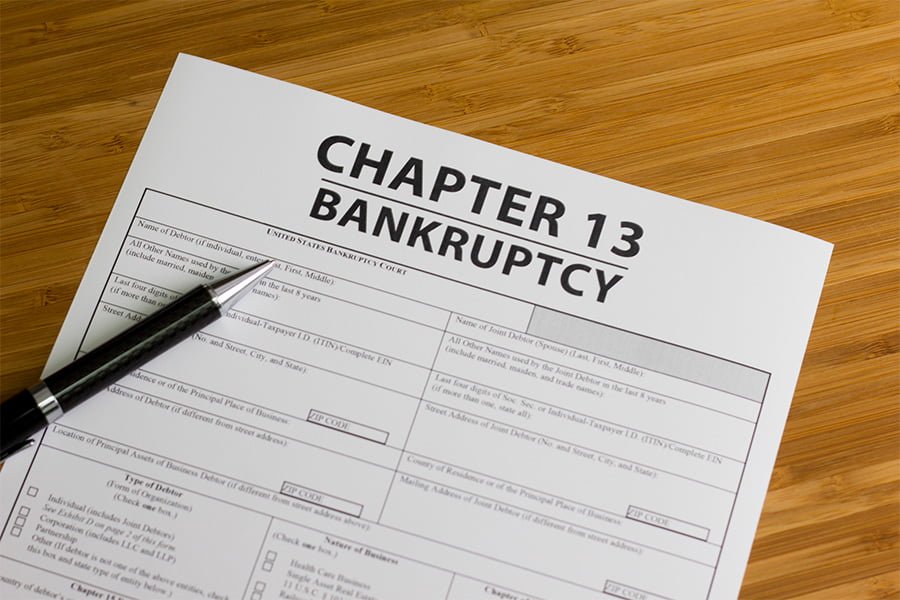Menu
Chapter 13 Bankruptcy

Chapter 13 is the chapter of the Bankruptcy Code that involves reorganization for individuals. Chapter 13 allows an individual to propose a plan to repay creditors over three to five years. In most cases, Chapter 13 allows you to pay your unsecured creditors (e.g., credit cards, medical debt, personal loans, etc.) only a fraction of what is owed. There are many reasons why Chapter 13 could be the right choice for you. The Jones Law Firm will thoroughly review your options with you before you file. Learn more about what we do for you or contact us today to schedule a free consultation.
Eligibility for Chapter 13 Bankruptcy
Unlike Chapter 7, most individuals qualify for Chapter 13 bankruptcy. The following are the only requirements to file Chapter 13 bankruptcy:- You must have a source of income. Chapter 13 requires you to make monthly payments according to a Chapter 13 plan. You need a regular source of income to make these payments.
- Your total debt balances must be below certain amounts. As of April 1, 2019, the limits are $419,275 for unsecured debt and $1,257,850 for secured debt until 2021. If your debt exceeds these amounts, you may have the option of filing Chapter 11 bankruptcy.
Why Choose to File Chapter 13?
People choose to file Chapter 13 bankruptcy for a variety of reasons. Sometimes people choose to file Chapter 13 because they are not eligible to file Chapter 7. Other times, people choose Chapter 13 because it offers certain benefits and advantages that Chapter 7 simply does not offer.1. You don’t qualify for Chapter 7.
If your income is too high and you fail the Chapter 7 means test, Chapter 13 can be a great option. Chapter 13 is designed so that you pay only what you can afford. We will draft a budget and determine a Chapter 13 plan payment that you can afford to pay. Also, if you have received a Chapter 7 discharge in the last eight years, you may not qualify for a discharge in Chapter 7; however, you may qualify to get a discharge if you file Chapter 13.2. You are behind on your mortgage payments.
Chapter 13 lets you catch up on delinquent mortgage payments over three to five years. Even if your home is in foreclosure, we can usually still use Chapter 13 to get you back on track. As long as you make all of your Chapter 13 plan payments, you will be completely current on your mortgage payments when you finish your bankruptcy case. Important: If your home is in foreclosure and is scheduled for sheriff sale, call us immediately to determine your options.3. You are behind on your car payments.
If you are behind on your car payments, Chapter 13 allows you to immediately catch up. Your car payment will be a part of your Chapter 13 plan payment. As long as you make all of your plan payments, you will own your car free and clear when your bankruptcy ends. Even if your car has been repossessed, we can usually recover it if you file your bankruptcy case before the car is sold.4. You have tax debts.
If you owe taxes (federal, state, or local), Chapter 13 can allow you to pay these debts over three to five years. Some tax debts do not even need to be paid in full. In most cases, as long as you make all Chapter 13 plan payments and stay current with your ongoing tax obligations, you will have no tax debt when your bankruptcy ends.5. You owe a domestic support obligation.
If you are behind on alimony or child support payments, Chapter 13 can allow you to get current on these obligations over three to five years. It is important to remember that you still must make your ongoing child support and alimony payments as they come due.6. You own non-exempt assets.
If you own a non-exempt asset that could be taken by a Chapter 7 Trustee and liquidated, Chapter 13 can be a great option. Chapter 13 Trustees do not liquidate assets. You will need to propose a plan that pays the creditors at least the value of the non-exempt asset over three to five years.7. You have unmanageable student loan payments.
Chapter 13 can pause student loan payments and allow you to take care of other debts for three to five years. It is very important to remember that most student loans cannot be discharged in bankruptcy. Further, student loans continue to accrue interest during Chapter 13. When you meet with The Jones Law Firm, we will let you know the advantages and disadvantages of filing Chapter 13 when you have student loan debts.8. You want to pay some of your debts.
Some people simply wish to pay some of their debts. Even a person who otherwise qualifies for Chapter 7 can file a Chapter 13 instead just to pay some of their debts. If circumstances change during the case, you may even have the option to convert your case to Chapter 7. Chapter 13 is a totally voluntary bankruptcy. You can’t be forced to file a Chapter 13, and you can’t be forced to remain in Chapter 13.Fees for Chapter 13 Bankruptcy
A huge benefit of Chapter 13 is that most of your attorney’s fees can be deferred over three to five years and paid as part of your Chapter 13 plan payments. However, you will need to pay the court filing fee prior to filing the case.Credit Counseling
You must complete a credit counseling class prior to filing bankruptcy. During your initial consultation, we will provide you information about this course. The course usually takes less than an hour and can be completed online or over the phone. After completing credit counseling, you will receive a certificate of credit counseling that is valid for six months. Please contact us immediately after completing your course so we can schedule your appointment to sign your bankruptcy petition.Filing Your Case
When you are ready to file your Chapter 13 case, we will schedule an appointment for you to sign your petition. We will provide you with a list of all documents and information you will need to provide our office before you file, as well as the information you will need to bring to your petition signing appointment. Some items that may be required include the following:- Six months of paystubs
- Car title
- Proof of insurance (vehicle and homeowner’s)
- Deed and mortgage documents
- Bank statements
- Retirement account statements
- List of all your debts (**we can help you get your credit report)
- List of all your assets

